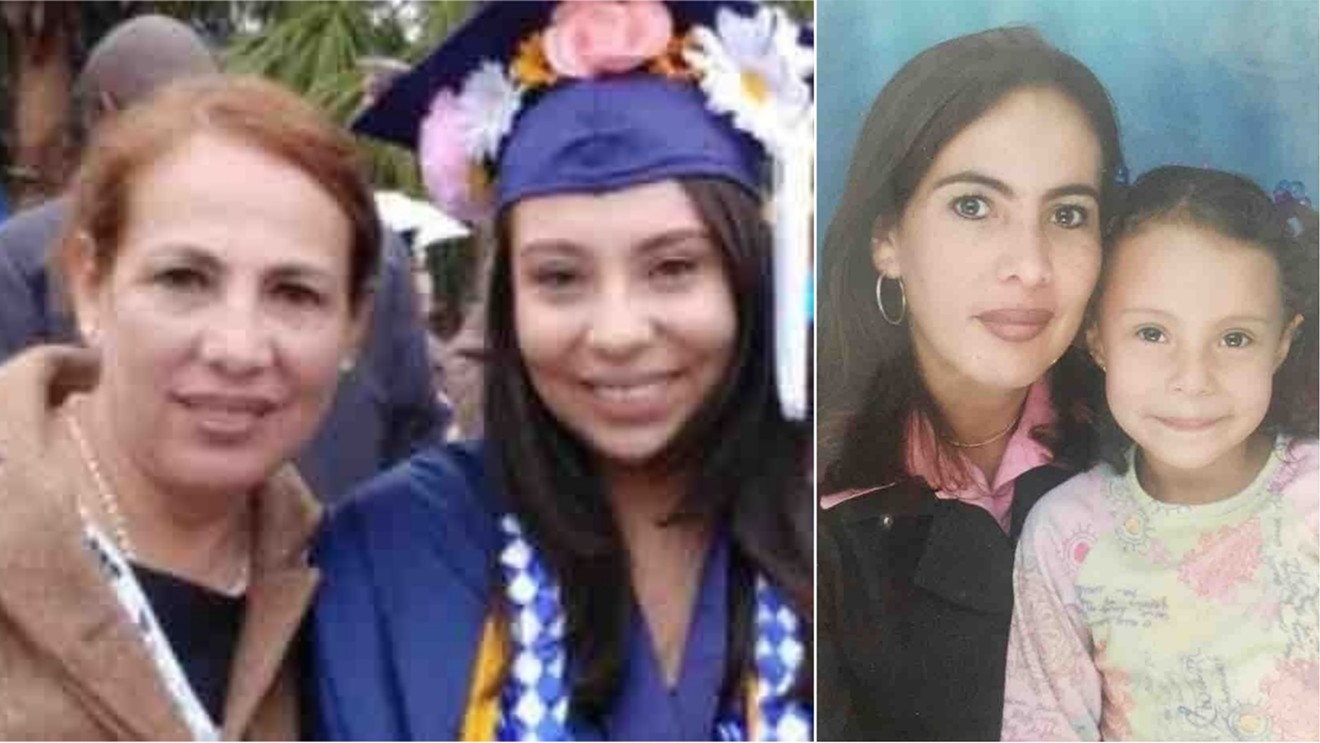Still, Caceres was able to obtain a work visa valid May 15 through 2019. But when she showed up for a routine Immigration and Customs Enforcement (ICE) check-in with agents in Jacksonville this past May 21, the agents ignored her visa, threw an ankle monitor on her, and detained her indefinitely. As the left-leaning ThinkProgress first reported yesterday, Caceres has since been shipped to the Broward Transitional Center in Pompano Beach, more than 300 miles from her home in Jacksonville. (Her last name has been changed in this story at her family's request for fear of repercussions from immigration officials.)
Gaona, Caceres' daughter, has since launched a GoFundMe to crowdfund resources to help secure her mother's release from ICE detention in South Florida. She says there's no reason to keep her mom locked up; she believes ICE is indiscriminately detaining people to nickel-and-dime their families.
"To me, they’re profiting off her being there," Gaona says. "We have to pay for her commissary. Just for her to call me, it costs $20 for like 20 minutes. She had to pay for her application for work authorization, and now she doesn’t get to work for the year that she paid for. If she has to go back, that’s obviously sad, but can we at least buy her a ticket and hug her goodbye? That's all we want."
In response, ICE Miami spokesperson Nestor Yglesias forwarded New Times the same statement he sent ThinkProgress. He noted Caceres had been issued a final order of deportation in 2011 but had benefited from an Obama-era policy that discouraged ICE from deporting noncriminal immigrants and refugees.
Donald Trump reversed that policy shortly after taking office. In February 2018, the Washington Post reported ICE had arrested 37,734 "noncriminal" immigrants in 2017, more than double the number from Obama's final year in office. Homan's quote suggests that the change led to Caceres' detention last week:
“Mary [Caceres] entered the country on a nonimmigrant visa in September 2005, but failed to depart in accordance with the terms of her admission. On Feb. 15, 2011 an immigration judge issued her a final order of removal, and ICE arrested her May 21 pursuant to the judge’s order.Because she overstayed a visa, Caceres did not commit a crime — visa overstays are civil infractions, compared to illegal border crossings, which are criminal offenses according to the U.S. code.
As Director [Thomas] Homan has stated, ICE will no longer exempt classes or categories of removable aliens from potential enforcement. All of those in violation of the immigration laws may be subject to immigration arrest, detention and, if found removable by final order, removal from the United States.”
As New Times previously reported, Florida saw a 75 percent spike in ICE arrests from 2016 through 2017, the largest jump for any region in the nation. (ICE arrests locally and nationally have still not reached their historic peak under President Barack Obama, but immigration activists were also furious with his administration as well.) ICE and Customs and Border Patrol (CBP) agents have been accused of a raft of misdeeds in Florida since Trump took office: From apprehending a man at a food-sharing event for the homeless, to combing through Greyhound buses to check people's "papers," to forcing immigrants at a Miami ICE check-in to stand in the rain and hot sun for hours at a time. Activists in South Florida over the weekend held a protest in solidarity with Claudia Patricia Gómez González, a Guatemalan refugee shot to death by a CBP agent in Texas. Gómez González said she hoped to work in the States and pay for her education.
Gaona, meanwhile, now lives in Baltimore and attends graduate school at Johns Hopkins University. She says she received a frantic call May 21 from her mother, who was in tears when Gaona picked up the phone. ICE agents had informed her mom that she had missed a scheduled check-in, so they were going to place an ankle monitor on her (a practice many immigrant activists say is needlessly expensive and exploitative) and shorten her work visa to three months.
The family admits Caceres might have missed one meeting, but that's only because her immigration lawyer committed suicide and the family struggled to contact ICE amid the chaos of finding new representation.
"At that point, I decided right then to buy a ticket back [to Florida] from Baltimore," Gaona says.
Instead, Gaona says, ICE agents in Jacksonville changed their minds and, after briefly testing the ankle monitor outside, informed Caceres that she would be placed in a detention center. Gaona says ICE has not explained why agents changed their minds, nor does she know yet if her mother is slated for deportation.
But Gaona still flew back to Florida. When she arrived, she says, her mother was being held in Baker County, just west of Jacksonville. During Gaona's visit, ICE forced her to interact with her mom through a TV screen rather than meet face-to-face. She says agents also refused to let her hand her mother a family photo. After the meeting, the family says, Caceres was shuffled through multiple detention centers before landing at the center in Pompano Beach. When Caceres finally called her daughter, she said she wasn't able to shower or brush her teeth for four days while she was being carted around Florida.After 13 years of fighting an unjust immigration system & trying to do things the RIGHT way, my mom was arrested and treated like a criminal today. My mom has NO criminal record/ paid her taxes. don’t know when I’ll see her again. WE NEED IMMIGRATION REFORM. NOW. @UNITEDWEDREAM pic.twitter.com/qqHgwS4AEu
— D (@danielagaona_) May 21, 2018
Now, Gaona says, she believes her mother is being held against her will in order to make more money for ICE and its contractors. The Broward Transitional Center is a private facility run by the Boca Raton-based GEO Group, the second-largest private-prison company in America. GEO is a major donor to state and federal politics. In addition to dumping money into the campaign coffers of nearly every major Florida Republican (and many Democrats), GEO also has deep ties to the Trump administration and Attorney General Jeff Sessions. The Broward Transitional Center specializes in holding noncriminal detainees — in 2013, a group of lawmakers sent ICE a letter detailing allegations of medical malpractice and mistreatment at the facility.
"She’s not a criminal. She's done everything she could to not be in this situation," Gaona says. "We've paid thousands of dollars in legal fees and to immigration services to not be in this situation, and now we have a lawyer to try to get her out. We already spent thousands of dollars over a decade."
Gaona says that before her mother took her to the United States, Caceres grew up with 12 other siblings in a single-room home in Colombia. Gaona says the family lived in a "guerrilla-dominated" town where warlords routinely entered their home and forced the family to cook them meals. After Gaona's uncle was killed by guerrillas, her mother took her and fled — and sometimes worked three jobs at once to ensure her daughter could attend school.
"That's all she wanted," Gaona says, "for me to go to school."












